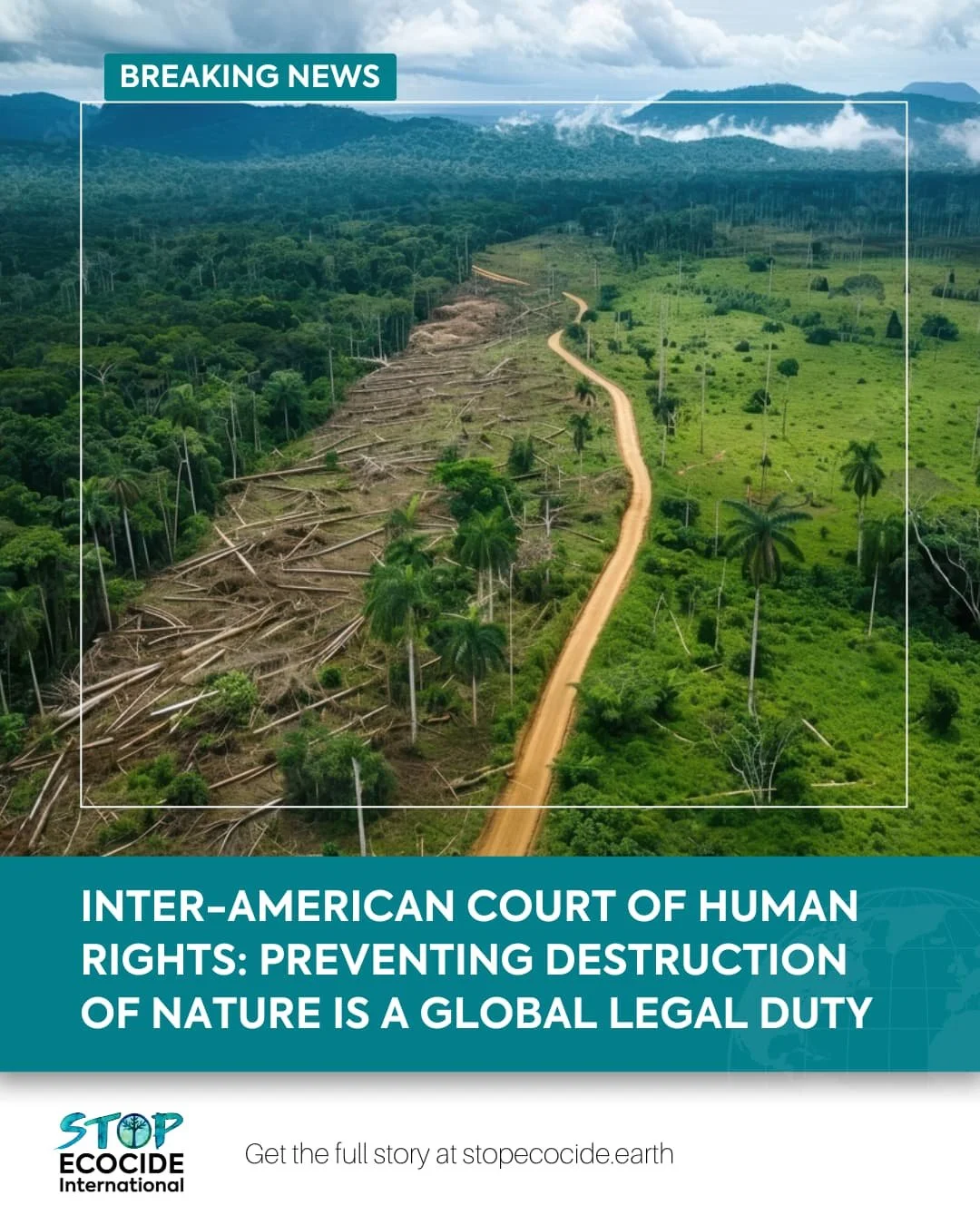Inter-American Court of Human Rights: Preventing Destruction of Nature is a Global Legal Duty
Summary:
The Inter-American Court of Human Rights made public its Advisory Opinion on the climate emergency and human rights on 3 July, following more than two years of deliberation.
Advisory Opinion No. 32, requested by the States of Chile and Colombia in 2023, affirms that the international obligation to prevent irreversible harm to the environment and the climate constitutes a jus cogens norm — that is, a peremptory norm of international law.
In addition to emphasising the obligation of cooperation between states in environmental matters, the Advisory Opinion addresses the right to a healthy environment and the recognition of nature as a subject of rights.
Although the Advisory Opinions are not binding, this marks the first time a human rights court has recognised preventing irreversible harm to nature as a legal duty no state can avoid, comparable in weight to bans on slavery or genocide. While this interpretation currently comes from the Inter-American Court, it signals a legal paradigm shift and is expected to influence jurisprudence across Latin America and support the growing global recognition of environmental protection as a cornerstone of international human rights law.
After reviewing the submitted background information and gathering reliable scientific evidence, the Court analyzed the American Convention on Human Rights and ruled that States must adopt all necessary measures to mitigate risks arising, on the one hand, from the degradation of the global climate system and, on the other, from exposure and vulnerability to the effects of such degradation.
The Court also placed particular emphasis on the obligation of States to cooperate in environmental matters, especially in contexts where the international community pursues common objectives or faces challenges requiring collective solutions.
Furthermore, the Court elaborated on the Right to a healthy environment, the protection of Nature as a rights-bearing entity, and clearly established that there exists an international obligation to refrain from causing irreversible harm to the environment and the climate—an obligation the Court characterized as a peremptory norm of international law, that is, a norm of jus cogens.
In this regard, the Court noted that “…efforts are underway to criminalise, at both national and international levels, conduct that causes massive and long-lasting harm to our ecosystems…”, implicitly endorsing, though not explicitly mentioning, the future establishment of the crime of ecocide. These efforts, along with a body of international environmental norms, have crystallised and progressively formed “a core normative framework whose protection admits no derogation, particularly in the face of risks of irreversible harm to life-sustaining ecosystems” (Para. 287).
In another notable passage of this Advisory Opinion, the Court stated: “The prohibitions arising from the obligation to preserve our common ecosystem, as a precondition for the enjoyment of other rights already recognised as fundamental, are of such significance that they must not admit any derogation. Thus, they possess the character of jus cogens.” (Para. 291).
It is important to clarify that, under the American Convention on Human Rights, the Court’s advisory opinions are not binding. However, in practice, the Court incorporates these arguments into its future reasoning in contentious cases, closely adhering to the guidelines set forth in each advisory opinion.
Jojo Mehta, Executive Director and Co-Founder of Stop Ecocide International, stated: "This Advisory Opinion expresses in legal terms the fundamental shift in understanding we are beginning to see emerging around the globe. We are finally realising that nature is not expendable; that we have a foundational responsibility to preserve the living world that sustains us. This obligation is increasingly being recognised also in criminal law."
For his part, Rodrigo Lledó, SEI Director for the Americas, positively assessed this Advisory Opinion, stating that: "In addition to being incorporated into the doctrine of the Inter-American System itself, it may also produce indirect effects in other regional and global forums on human rights and the environment. From now on, there is no longer any doubt about the existence of an international obligation of States to protect the environment from irreversible damage. This obligation has been characterised as a jus cogens obligation, that is, an obligation that is at the very core of international law, which is binding and from which no agreement to the contrary is permitted."
You can read the full advisory opinion here.

